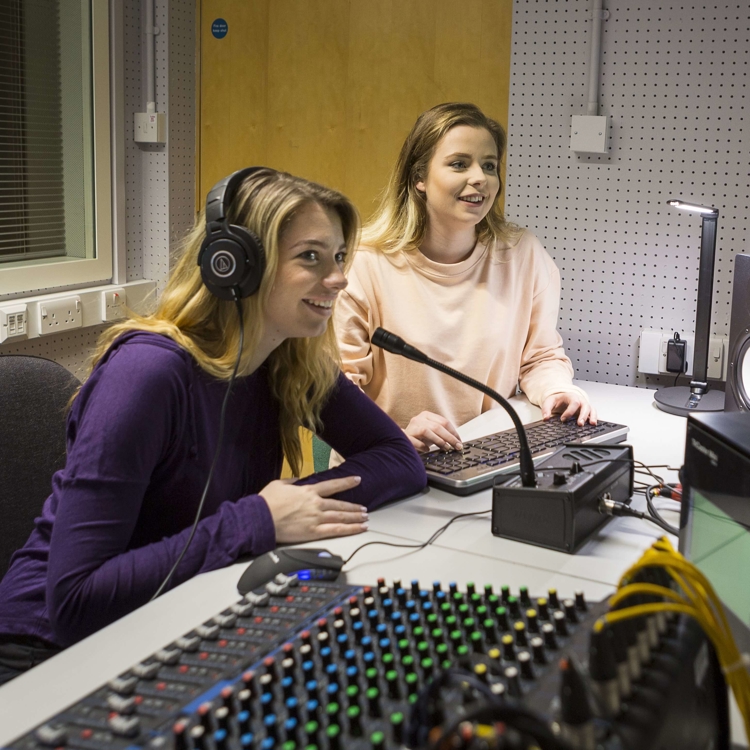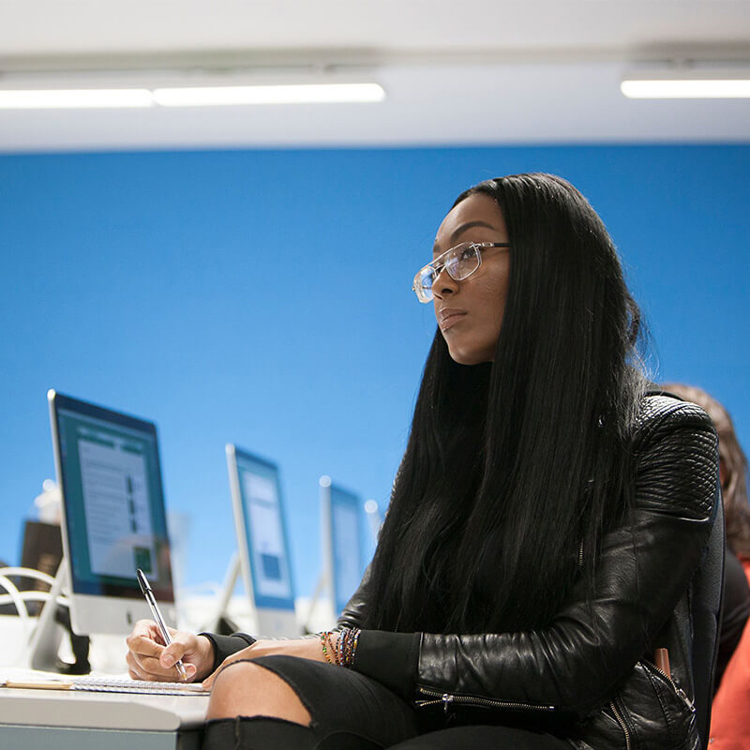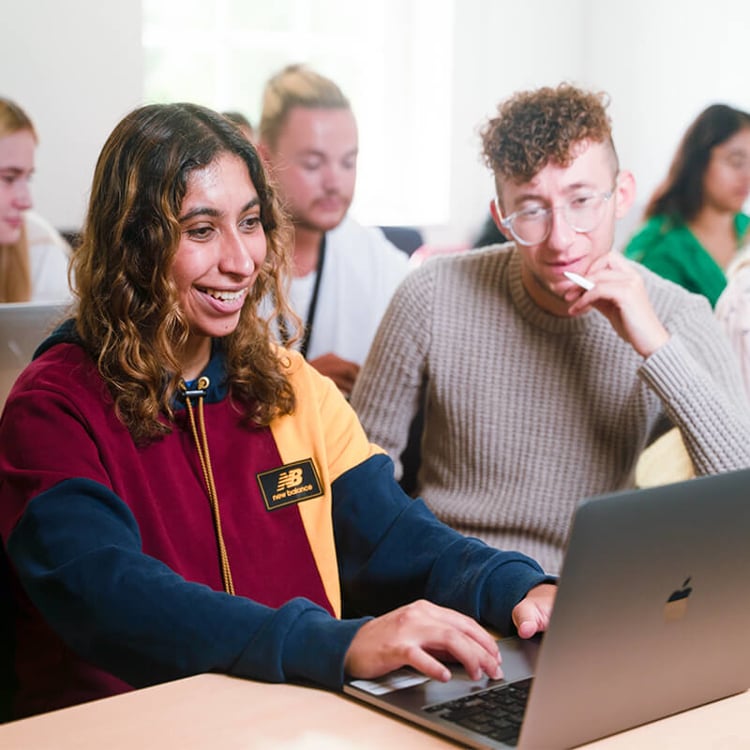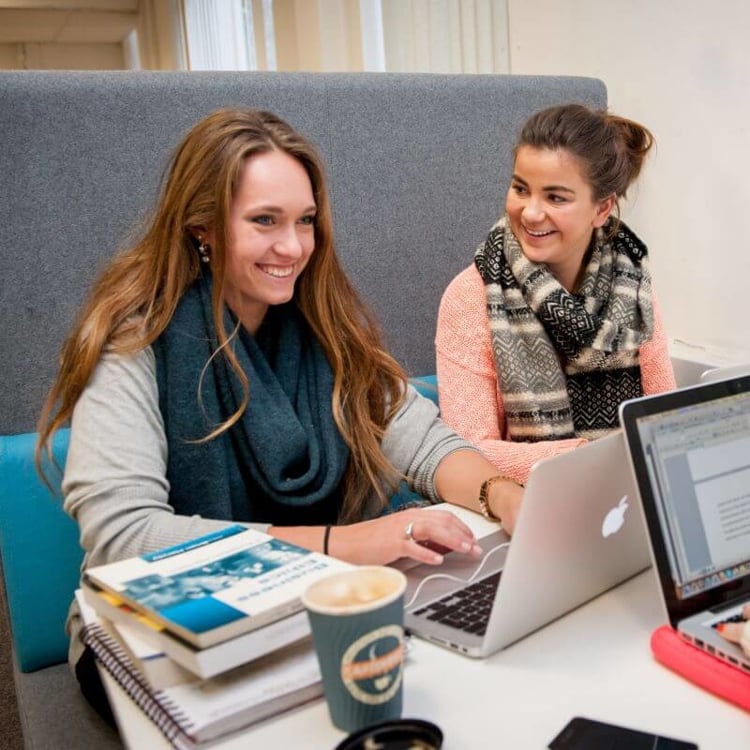/ Foundation /
Start date:
September 2025
January 2026
Entry tariff:
Foundation Year: 64–80 UCAS points (or equivalent)
UCAS code:
P4FS

Get ready to succeed in a media degree, and learn core academic and professional skills, while also developing your English language skills.
Did you know
You'll develop your English language skills and gain the academic skills and media knowledge you need for your chosen undergraduate degree.
Top 3 modern university in London
(Complete University Guide 2025)

Ranked in the top 15% in the world
Times Higher Education Young University Rankings 2024

#8 in England for undergraduate student satisfaction
National Student Survey 2024

Modules
30 credits
You will develop your core academic and integrated English language skills of speaking, listening, reading and writing. You will become familiar with key academic skills and concepts, such as referencing methods and awareness of academic integrity and tone. You will apply these skills and knowledge to both broad topics and also your chosen subject pathway.
Teaching and Learning
You will be required to actively engage in on-campus learning for up to 10 hours a week.
You will be taught through a full range of teaching and learning methods, which include lectures, seminars, workshops, discussion groups, group directed tasks and presentations. This will enable you to learn from your peers and tutors in both structured and information settings.
You will be encouraged to think creatively about your approach to learning and discussions with your peers. You will also have access to recordings, resources, links and signposting through Moodle to enrich your learning.
Assessment
You will be assessed through group and individual presentations, comparative and reflective essays, multiple choice exams, coursework and reports, oral exams, portfolios, case studies and blogs.
30 credits
You will develop your research, numeracy and information technology skills. You will investigate the difference between primary and secondary research, conduct your own research project and demonstrate your findings through data analysis. You will also develop your awareness of equality, diversion and inclusion in the UK, through a real-world issue; discrimination in the workplace.
Teaching and learning
You will be required to actively engage in on-campus learning for up to 10 hours a week.
You will be taught through a full range of teaching and learning methods, which include lectures, seminars, workshops, discussion groups, group directed tasks and presentations. This will enable you to learn from your peers and tutors in both structured and information settings.
You will be encouraged to think creatively about your approach to learning and discussions with your peers. You will also have access to recordings, resources, links and signposting through Moodle to enrich your learning.
Assessment
You will be assessed through group and individual presentations, comparative and reflective essays, multiple choice exams, coursework and reports, oral exams, portfolios, case studies and blogs.
30 credits.
This module invites you to take on the role of a video content creator, building on the skills acquired in Fundamentals of Image Making. You will examine the dynamic world of social media as news, with a particular focus on the theme of "identity." You will explore the impact of distributed media, examining how non-professionals contribute to shaping new media practices through platforms like YouTube, TikTok and Instagram.
Throughout the module, you will critically engage with the history and implications of self-promotion on social media, analysing its influence on society and the efforts to address its challenges. You will also explore citizen journalism, where social media content plays a pivotal role in reporting on crises and events inaccessible to traditional news outlets.
Teaching and learning
In weekly seminars, you will explore citizen journalist strategies – from video blogging to video editing – for creating engaging media content. Alongside these hands-on activities, you will engage deeply with thought-provoking questions about identity, voice, and representation in the digital age.
By the end of the module, you will have the skills to create compelling video content and a nuanced understanding of the role of social media in shaping our world.
The teaching delivery for each module consists of one, one-three-hour lecture and one, two-hour workshop per week. Lectures will provide a critical foundation, introducing key concepts such as identity, social media and citizen journalism, while seminars will focus on hands-on skill development.
There will be an additional 30 minutes of online digital support per week. This will consist of virtual learning tools to extend access to resources through online tutorials, videos, and discussion forums.
Due to the highly technical nature of this module, you will be taught in a computer lab equipped with Adobe Creative Suite to support the required software-based learning outcomes.
You will also have access to DSLR cameras, microphones, lighting equipment, and a dedicated photography/filming studio, to facilitate practical exercises in media production.
Assessment
This module will be assessed using critical commentary and a self-produced video.
30% - critical commentary, you will explore the module theme ‘identity’. You will critically analyse a piece of video content that engages with the concept of identity.
70% - self-produced video, you will produce a four-minute video as a piece of citizen bases, engaging with the module theme of ‘identity’.
30 credits
In this module, you will critically explore how media representations are constructed and manipulated. You will examine semiotics, framing, and context, understanding how these elements influence perception.
The module will also address the social and cultural impacts of altered imagery, focusing on the concept of authenticity and the ethical considerations of image manipulation, while reflecting on historical perspectives of visual content authenticity.
You will gain practical skills in photography, learning to control key technical aspects like aperture, shutter speed, ISO, and colour temperature. You will also explore the use of natural and artificial lighting to create specific moods, alongside composition techniques such as focal length and depth of field to enhance your imagery.
The module also introduces you to Adobe Photoshop, starting with basic tools and non-destructive editing techniques. You will advance to more complex methods like masking and compositing, developing a cohesive photographic project. Finally, you will manage workflows and deadlines, preparing your work for an online portfolio to showcase your skills as both a photographer and an image-maker.
Teaching and learning
The teaching delivery for each module consists of one, one-three-hour lecture and one, two-hour workshop per week. Lectures will provide a critical foundation, introducing key concepts such as media practices, and image construction, whilst seminars will focus on hands-on skill development.
There will be an additional 30 minutes of online support per week. This will consist of virtual learning tools to extend access to resources through online tutorials, videos, and discussion forums.
Due to the highly technical nature of this module, you will be taught in a computer lab equipped with Adobe Creative Suite to support the required software-based learning outcomes.
You will also have access to DSLR cameras, microphones, lighting equipment, and a dedicated photography/filming studio, to facilitate practical exercises in media production.
Assessment
This module will be assessed using a research presentation and a creative online portfolio.
30% - research presentation, you will deliver a 5-minute in class exploring the module of theme of ‘authenticity’. This will involve selecting a visual event from a media-related field and critically analysing how the chosen image(s) engage with the concept of authenticity.
70% - creative online portfolio, you will produce a photographic series that creatively interrogates the notion of ‘authenticity of the image’.
These modules are those we currently offer and may be subject to change.

Skills
You will develop your English language and academic skills (speaking, listening, reading, and writing) and gain a basic understanding of using English for academic purposes and a thorough grounding in academic study skills, such as essay structure, exam technique, referencing, journal and library research.
You'll develop skills in practical application of ideas, process and themes within media practice and learn the ways in which images are constructed and manipulated.
You will be introduced to key theoretical concepts of new 'distributed media' by looking at the role non-professional individuals now play in forming new media practices via social media.
Learning
You’ll be taught via lectures, seminars and workshops by our passionate and committed academic staff.
You’ll have regular contact with your academic guidance tutor to help you develop as well as face-to-face and online careers and study support.
As our courses are taught over no more than three days per week, you’ll have the flexibility to take on paid part-time work, placements, or internships – helping you gaining real-world experience.


Assessment
Benefit from assessments that prepare you for life beyond university.
You’ll experience a wide range of assessments that enhance your understanding, explore ideas in depth and express your creativity.
This includes:
- Coursework
- Reports
- Essays
Degree pathways
Once you’ve completed your IFP, you can progress onto your chosen undergraduate degree here at Roehampton.
Courses include:
Our careers support team is available to support you from the start of your studies. They will help you build your CV, prepare for interviews, and meet and learn from successful graduates working at the top of their careers.

Open days
Get a real taste of our campus, community and what it’s like to study at Roehampton
Applying
International undergraduate students apply through our direct application system.
Course subject to curriculum enhancement and revalidation.
Specific entry requirements
- IELTS: 4.5 / 5.0 / 5.5
- UCAS International Equivalents (64 entry tariff)
- 5 GCSE / GCSE passes at grade C/4 or in an international equivalent
Looking to work out your UCAS points or find out about our entry requirements? Find out more.
When we consider applications to study with us, we form a complete view of your achievements to date, and future potential, and can offer flexibility in entry requirements. Find out more about our Contextual Offer scheme.
General entry requirements
September 2025 entry tuition fees (international)
International Foundation Pathway: Certificate of Higher Education: £16,950




